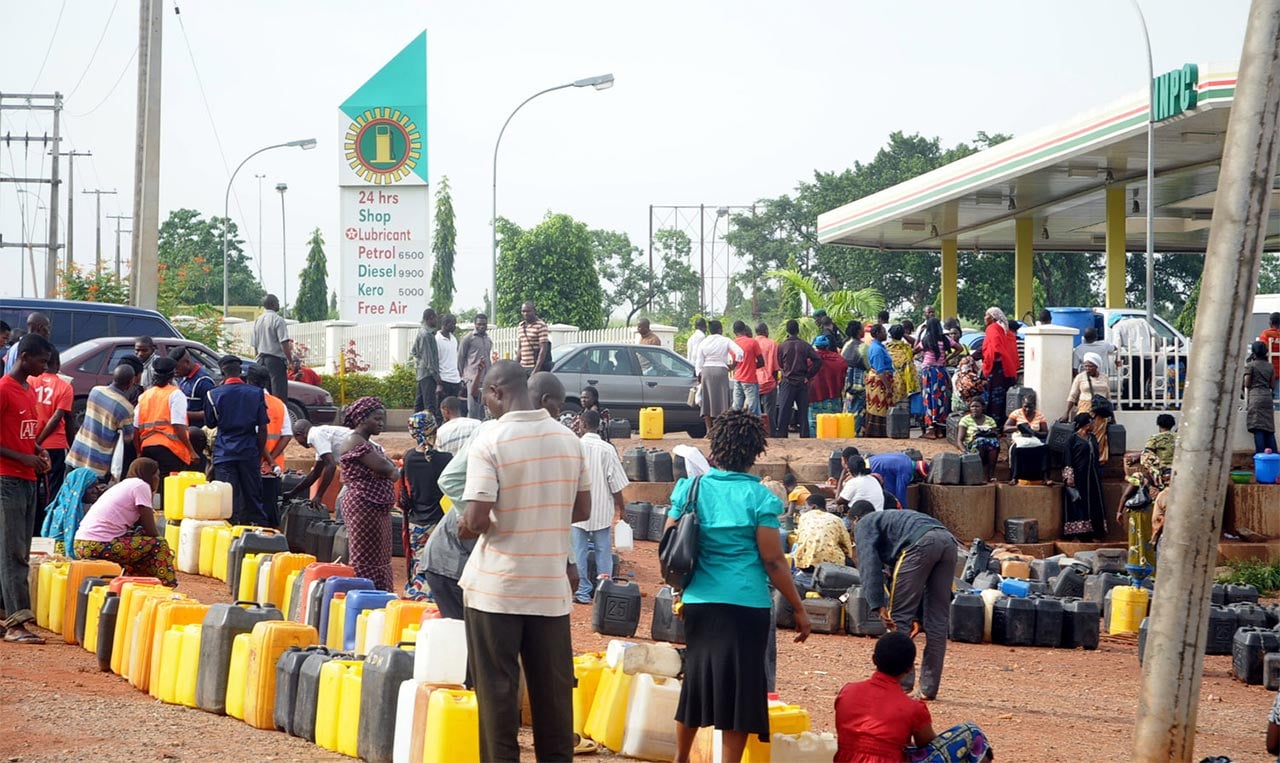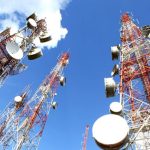...To get all news updates, Join our WhatsApp Group (Click Here)
Also Join our WhatsApp Channel (Click Here)
There are indications that the pump price of premium motor spirit, popularly known as petrol, may rise in filling stations as the Nigerian National Petroleum Company Limited finally admitted that it was facing challenges due to a $6bn debt.
After weeks of denial, the NNPC admitted on Sunday that it owed its petrol suppliers the sum of $6bn, saying it was facing financial strains due to petrol supply costs.
In a statement by its Chief Corporate Communications Officer, Olufemi Soneye, the state-owned energy company subtly confirmed that the debt was the reason for the fuel queues in filling stations across the country, stating that it is impacting supply sustainability.
The PUNCH reported in July that Nigeria’s debt to suppliers of petrol surpassed $6bn, making the NNPC struggle to cover the gap between fixed pump prices and international fuel costs.
A Reuters report stated that the national oil company began struggling early this year when late PMS payments surpassed $3bn.
The company had still not paid for some January imports, traders said, and the debt keeps piling up. Under contract terms, NNPC is meant to pay within 90 days of delivery.
“The only reason traders are putting up with it is the $250,000 a month (per cargo) for late payment compensation,” one industry source said.
Since June, Nigeria’s tenders to buy PMS were smaller, traders said.
From two in July, three more traders were said to have stopped supplying PMS to the NNPC as of now, making a total of five unpaid traders.
But Soneye, in August, denied that the NNPC owed international oil traders $6.8bn.
“NNPC Ltd does not owe the sum of $6.8bn to any international trader(s). In the oil trading business, transactions are carried out on credit, so it is normal to have outstanding amounts at certain times. However, NNPC Ltd, through its subsidiary NNPC Trading, maintains many open trade credit lines with several traders. The company is fulfilling its obligations on a first-in-first-out basis,” he stated.
The NNPC has given various reasons for the lingering fuel crisis, including bad weather and the inability of vessels to discharge, among others, but none of the measures it has taken stopped the queues at the filling stations.
On Sunday, the company made a U-turn in admitting that it was facing financial constraints.
“NNPC Ltd has acknowledged recent reports in national newspapers regarding the company’s significant debt to petrol suppliers.
“This financial strain has placed considerable pressure on the company and poses a threat to the sustainability of fuel supply,” Soneye said in a statement titled, ‘NNPC Ltd Faces Financial Strain Due to PMS Supply Costs, Impacting Supply Sustainability.’
He added that the company was collaborating with relevant government agencies and other stakeholders to maintain a consistent supply of petroleum products nationwide.
“In line with the Petroleum Industry Act, NNPC Ltd remains dedicated to its role as the supplier of last resort, ensuring national energy security.
“We are actively collaborating with relevant government agencies and other stakeholders to maintain a consistent supply of petroleum products nationwide.”
As Nigerians continue to complain over the lingering fuel crisis since July, the sudden admission by the NNPC of a claim it had severally denied, fuelled speculations that the Federal Government might stop paying what it termed “under-recovery” or shortfall on imported petrol.
The PUNCH learnt that the company might be contemplating taking the only way out of the debt challenges, which was to stop paying shortfalls that might no longer be sustainable.
When this happens, operators said the price of petrol would rise above N1,000 and interested accredited marketers would be able to import petrol, thereby removing the NNPC monopoly.
FG pays subsidies
Recently, the NNPC, being the sole importer of petrol, admitted that the Federal Government subsidised the current price of PMS, which the marketers recently put at N1, 117 per litre.
Though the NNPC denied paying fuel subsidies to marketers in the last nine years, it said the government allowed it to sell at a price below the landing cost.
The Chief Financial Officer of the company, Alhaji Umar Ajiya, stated this in Abuja when the company presented its 2023 report.
“In the last eight to nine years, NNPC has not paid anybody a dime as subsidy; no one has been paid a kobo by NNPC in the name of subsidy. No marketer has received any money from us by way of subsidy.
“What has been happening is that we have been importing PMS, which has been landing at a specific cost price, and the government tells us to sell it at half price. So, the difference between the landing price and that half price is a shortfall.
“And the deal is between the Federation and NNPC to reconcile. Sometimes, they give us money, so there is no money exchanging hands with any marketer in the name of subsidy,” he said.
He stated that credit lines were prevalent in downstream businesses based on the worldwide commercial system.
He added that the company was in an open credit agreement with PMS suppliers in the past, with term-line contracts for payment.
Also, Dapo Segun, the Executive Vice President of Downstream at NNPCL, said that establishing an open credit agreement with suppliers spoke volumes about the credibility the national oil company had built over time.
“Concerning the outstanding to the suppliers, it is not in that magnitude that has been put out, it is lower than the $6.8bn
“What really matters is the relationship between us and our suppliers to ensure that we keep faith in making these payments to our suppliers, which we have done over time.
“You would understand that it is not a static figure, and I wouldn’t want to quote any figure. When we make payments, it goes down, and when they supply products, it goes up. It is a dynamic way, but the most important thing is to ensure that we continue to make PMS available across the country,” he said.
According to the NNPC, being the only importer of petrol, the Federal Government pays it to sell fuel to Nigerians at a subsidised rate.
However, this has led to incessant fuel scarcity across the nation as the debt to the international oil companies keeps piling up.
On May 29, 2023, President Bola Tinubu, announced that the fuel subsidy was gone.
However, with the floating of the naira, the price of imported petrol rose above the purchasing power of an average Nigerian, causing the Federal Government to intervene by capping the price below the landing cost and paying the shortfall.
The failure of the Federal Government to pay the shortfall is impacting fuel importation.
In May, the International Monetary Fund warned the Nigerian government to remove what it called implicit fuel and electricity subsidies.
In a report published by the IMF, the organisation told Nigeria that the subsidies would guzzle 3 per cent of the nation’s Gross Domestic Product in 2024 as against 1 per cent in the year before.
According to the report, the IMF commended the Federal Government for, among other things, phasing out “costly and regressive energy subsidies”, saying this was critical to creating fiscal space for development spending and strengthening social protection while maintaining debt sustainability.
IMF noted after Tinubu removed subsidy, “adequate compensatory measures for the poor were not scaled up in a timely manner and subsequently paused over corruption concerns. Capping pump prices below cost reintroduced implicit subsidies by end-2023 to help Nigerians cope with high inflation and exchange rate depreciation”.
It appears the Federal Government is now ready to heed the advice of the IMF.
‘Partial deregulation killing’
The National Vice Chairman of the Independent Petroleum Marketers Association of Nigeria, Hammed Fashola, has charged the government to either return the fuel subsidy or remove it totally instead of engaging in partial deregulation.
“The Federal Government and the NNPC should just do this thing once and for all. If they want to deregulate, let them deregulate fully, because we know where we are going; that’s why you’re seeing this disparity whereby the NNPC retail is selling at N580 in Lagos and independent marketers will be selling at N800. You can see the gap. It’s killing our business, we are not making progress; it’s killing us.
“If the Federal Government wants to bring back the subsidy, let them bring it back fully so that everybody will know that we are on subsidised product; and it should cut across, not just for NNPC Retail. So, we will know that we are back to the subsidy regime which I don’t think is good for the economy of the country,” Fashola emphasised.
He stated that the price disparity is not good for the image of independent marketers, saying the masses do not understand why they sell at higher rates.
“If not that we are trying to educate people, many see us as bad people, they didn’t know it’s not our fault,” he posited.
The IPMAN leader added that the fuel crisis was because the NNPC has remained the only importer of PMS.
“The problem is that it’s only the NNPC that can bring this product because of forex. They are the only ones selling. Two or three independent marketers once tried to import, but they could not,” he stated.
The marketers submitted, “We need to brace up and face the reality once and for all. If the subsidy should go, let it go so that all of us will be operating on a level playing ground. That’s what we are asking for, not that NNPC Retail will be favoured and others will be suffering, and people will be seeing us as Shylock businessmen; it is not too good,” Fashola stressed.
As the fuel crisis lingers for about two months, our correspondent observed that the price keeps rising in filling stations owned by independent marketers.
From less than N700 in July, a litre of petrol rose gradually to above N900 in most filling stations in August ending. The upward trend continues with no successful attempt to stop it as of today.
“I just bought a litre of petrol for N980 in Ogere,” a visibly angry bus conductor told a passenger negotiating transport fare along the Lagos-Ibadan Expressway.
In filling stations being run by major marketers like NNPC Retail, Mobil, MRS, Conoil, Ardova, and TotalEnergies, the product sells below N700, but with long queues of motorists struggling to buy fuel.
It was also observed during the weekend that many of these major marketers, including the NNPC, run skeletal services due to inconsistent fuel supply.
The NNPC spokesman, Olufemi Soneye, told The PUNCH on different occasions that the queues being experienced in fuel stations across the country would be over in a few days.
However, the promises have continued to fail, leaving Nigerians in the struggle for energy security, especially in the transport sector.
Meanwhile, a depot operator told our correspondent that the desperation of marketers to get PMS should be blamed for the rise in price.
The operator, who did not want his name in print, told The PUNCH that many of the marketers struggle to outplay one another and are ready to buy at any price for they know they can sell at a higher price to make a profit.
Nonetheless, the operator submitted that the lack of enough supply is responsible for the desperation, saying a number of depots have been out of stock for weeks.
“Most time it is not the depot owners that hike the price, but the marketers struggling to outplay each other at the depots,” the source stated.
Our correspondent learnt that some individuals who act as middlemen between the depots and the filling stations sell to the highest bidders only, leaving out those who could not afford the bidding.
These middlemen, it was learnt, make profits just by negotiating prices with the filling stations through phone calls.
Meanwhile, another depot source told our correspondent that loading of fuel has improved during the weekend, expressing optimism that things would improve this week.
“Loading was better over the weekend. It is expected that the supply will get better. We loaded from Saturday till Sunday. We are hopeful the fuel situation will improve this week,” the source disclosed.
However, our correspondent reports that the purported improved loading of fuel has not been felt by Nigerians who still pay higher rates to buy fuel.
Findings by The PUNCH showed that the cost of transportation had risen by almost 40 per cent, depending on the destination.
You can get every of our news as soon as they drop on WhatsApp ...To get all news updates, Join our WhatsApp Group (Click Here)
Also Join our WhatsApp Channel (Click Here)

















